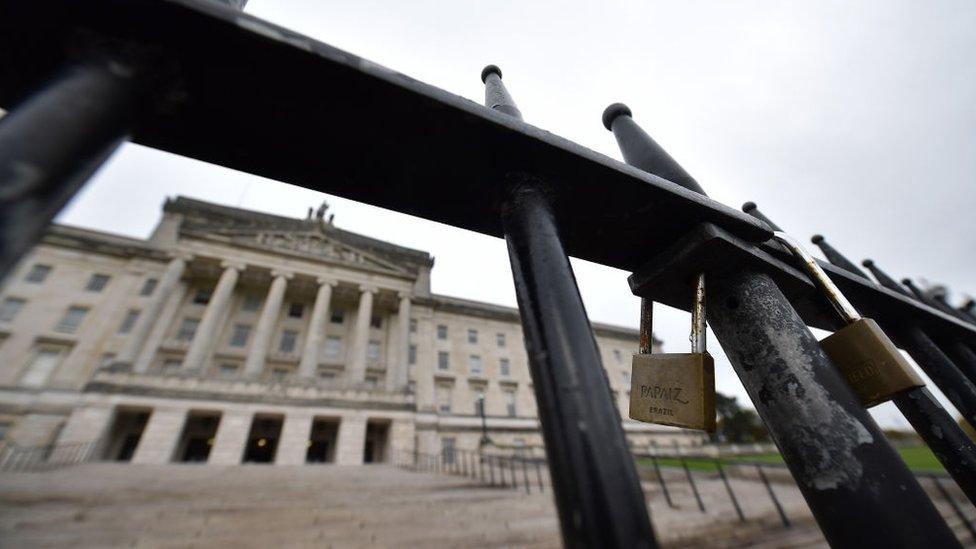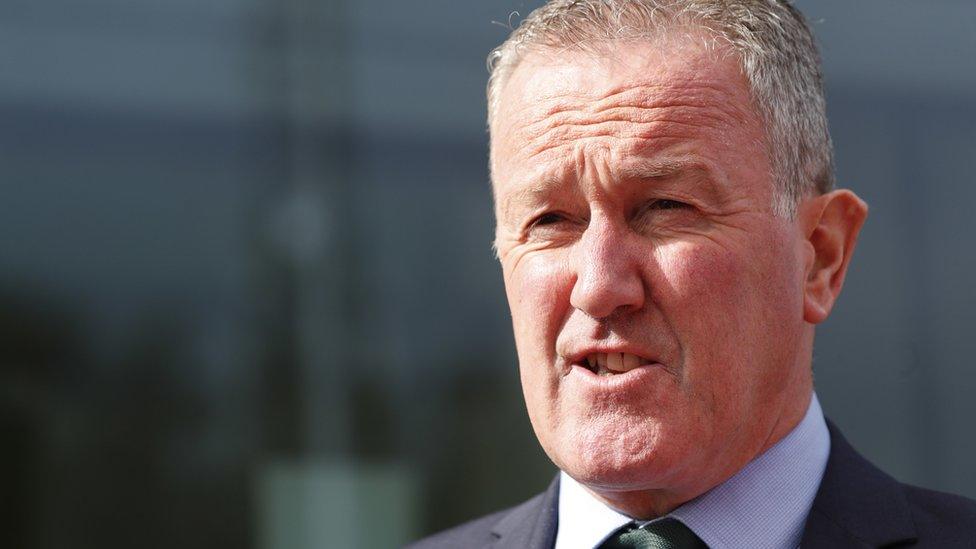Stormont collapse 'exacerbating budget crisis'
- Published

Stormont's budget crisis has been exacerbated by the lack of an executive, the Fiscal Council reports
The lack of a functioning Northern Ireland Executive has exacerbated a Stormont budget crisis, an independent watchdog has concluded.
Departments are on course to overspend by £650m this financial year, equivalent to almost 5% of the budget.
The Fiscal Council said this was mostly due to the unavoidable impact of inflation and pay pressures.
However spending control arrangements in the absence of ministers seem to be making the situation worse, it added.
Secretary of State Chris Heaton-Harris called the findings "alarming".
He said he would work with the Northern Ireland Civil Service to "work through the next steps needed on the NI budget".
An executive has not been in place since February when the Democratic Unionist Party (DUP) withdrew from the first minister's position in protest at the Northern Ireland Protocol.
A budget had not been passed at the time, so departments have been operating with contingency arrangements since then.
'Confronting difficult decisions'
The Fiscal Council found the lack of an executive and an assembly meant there had been weak oversight of departmental spending.
The Northern Ireland Executive gets the vast majority of its budget as a block grant from Westminster and is expected to operate within that total.
The council said the lack of a budget was a major problem which had been compounded by the inability to reallocate funds between departments.
Other factors exacerbating the situation were the ability of caretaker ministers to take spending decisions for which they do not have funding, the limited power of civil service accounting officers to impose discipline and the absence of assembly committees to scrutinise the evolution of the public finances through the year.
Sir Robert Chote, the council's chair, said higher inflation and upward pressure on public sector pay had created challenges for public services across the UK.
"As well as confronting the difficult near-term decisions, Stormont and Whitehall should think carefully about how best to manage similar situations in future before they occur again," he added.
'Budgets not stretching'

Former finance minister Conor Murphy said inflation and higher energy costs meant the anticipated budgets of departments in early 2022 were not "stretching as the year has gone on".
"Everything that was done that can be done in the limbo that we find ourselves in. Had an executive been in place, we would have been able to take decisions," Mr Murphy said.
Robin Swann told BBC News NI that the health department had not lost control of spending during his tenure as health minister.
He said: "What we were always working to was that budget envelope that we were actually given in regards to what we were able to spend but there was also those allocations and programs that had been agreed with the previous executive."
What could happen next?
In theory the Treasury will recoup the overspend from next year's block grant, which could mean significant spending cuts for some public services.
If the £650m overspend is fully recouped in 2023-24 this would see the block grant fall by 6.6% next year and rise by 6.8% in 2024-25.
If it was recouped over two years, the block grant would fall by 4.1% in 2023-24 and rise by 1.5% in 2024-25.
But the council says other options may be available.
The Treasury agreed a one-off loan to the executive in the 2014-15 financial year and later the Stormont House Agreement included provision for it to be repaid from asset sales and capital budget.
The Treasury could also agree additional ad hoc funding, either as part of the chancellor's Autumn Statement or the Northern Ireland budget, or as financial support for a deal to restore the executive.
The secretary of state has indicated he would legislate for a Stormont budget in the coming weeks.
The council says it will be an important decision on whether to wait for Autumn Statement on 17 November before setting a budget.
Related topics
- Published2 February 2024

- Published11 October 2022
